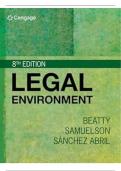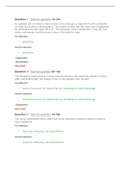, Solution Manual For: SM Legal Environment, 8th Edition Jeffrey F. Beatty Susan S. Samuelson Patricia Sanchez April 2022,
9780357634448;
Solution Manual For
SM Legal Environment, 8th Edition Jeffrey F. Beatty Susan S. Samuelson Patricia Sanchez April
2022, 9780357634448;
Chapter 1: Introduction to Law
Table of Contents
Multiple Choice Questions .......................................................................................................................................... 1
Case Questions ................................................................................................................................................................ 2
Discussion Questions..................................................................................................................................................... 3
Multiple Choice Questions
1. The United States Constitution is among the finest legal accomplishments in the history of the
world. Which of the following influenced Franklin, Jefferson, and the rest of the Founding Fathers?
A. English common-law principles
B. The Iroquois‘ system of federalism
C. Both A and B
D. None of the above
Answer: C. Both English common-law principles and the Iroquois’ system of federalism shaped the
Constitutional framers’ ideas.
2. Which of the following parts of the modern legal system are ―borrowed‖ from medieval England?
A. Jury trials
B. Special rules for selling land
C. Following precedent
D. All of the above
Answer: D. Countless parts of our modern system originated in Merry Olde England.
3. Union organizers at a hospital wanted to distribute leaflets to potential union members, but
hospital rules prohibited leafleting in areas of patient care, hallways, cafeterias, and any areas
open to the public. The National Labor Relations Board (NLRB), a government agency, ruled that
these restrictions violated the law and ordered the hospital to permit the activities in the cafeteria
and coffee shop. What kind of law was it creating?
A. A statute
B. Common law
C. A constitutional amendment
D. Administrative regulation
© 2022 Cengage. All Rights Reserved. May not be scanned, copied or duplicated, or posted to a publicly accessible 1
website, in whole or in part.
, Solution Manual For: Chapter 1: Introduction to Law
Answer: D. The NLRB, as an agency, creates regulations. Congress creates statutes, and
judges shape the common law.
4. If the Congress creates a new statute with the president‘s support, it must pass the idea by a
____________ majority vote in the House and the Senate. If the president vetoes a proposed statute
and the Congress wishes to pass it without their support, the idea must pass by a ____________
majority vote in the House and the Senate.
A. simple; simple
B. simple; two-thirds
C. simple; three-fourths
D. two-thirds; three-fourths
Answer: B. More than 50 percent to pass initially (a simple majority), two-thirds if an override
is necessary.
5. Dr. Martin Luther King, Jr., wrote ―An unjust law is no law at all.‖ As such, ―One has … a moral
responsibility to obey unjust laws.‖ Dr. King‘s view is an example of:
A. legal realism.
B. jurisprudence.
C. legal positivism.
D. natural law.
Answer: D. It is an example of the natural law theory of jurisprudence.
Case Questions
1. Lance, an Internet hacker, stole 15,000 credit card numbers and sold them on the black market,
making millions. Police caught Lance, and two legal actions followed, one civil and one criminal.
Who will be responsible for bringing the civil case? What will be the outcome if the jury believes
that Lance was responsible for identity thefts? Who will be responsible for bringing the criminal
case? What will be the outcome if the jury believes that Lance stole the numbers?
Answer: The civil cases will be brought by the victims of identity theft, and the outcome of a
successful case against Lance would be some type of monetary award for damages suffered. The
criminal case will be brought by state prosecutors and the outcome would be imprisonment for
Lance.
2. As The Oculist’s Case indicates, the medical profession has faced large number of lawsuits for
centuries. In Texas, a law provides that, so long as a doctor was not reckless and did not
intentionally harm a patient, recovery for ―pain and suffering‖ is limited to no more than $750,000.
In many other states, no such limit exists. If a patient will suffer a lifetime of pain after a botched
operation, for example, they might recover millions in compensation. Which rule seems more
sensible to you—the ―Texas‖ rule, or the alternative?
Answer: Answers will vary.
3. You Be the Judge: WRITING PROBLEM Should trials be televised? Here are a few arguments to
add to those in the chapter. You be the judge.
© 2022 Cengage. All Rights Reserved. May not be scanned, copied or duplicated, or posted to a publicly accessible 2
website, in whole or in part.
, Solution Manual For: Chapter 1: Introduction to Law
Arguments against Live Television Coverage: We have tried this experiment and it has failed.
Trials fall into two categories: Those that create great public interest and those that do not. No
one watches dull trials, so we do not need to broadcast them. The few that are interesting have all
become circuses. Judges and lawyers have shown that they cannot resist the temptation to play
to the camera. Trials are supposed to be about justice, not entertainment. If a citizen seriously
wants to follow a case, they can do it by reading online news reports or the daily newspaper.
Arguments for Live Television Coverage: It is true that some televised trials have been
unseemly affairs, but that is the fault of the presiding judges, not the media. Indeed, one of the
virtues of television coverage is that millions of people now understand that we have a lot of
incompetent people running our courtrooms. The proper response is to train judges to run a tight
trial by prohibiting grandstanding by lawyers. Access to accurate information is the foundation on
which a democracy is built, and we must not eliminate a source of valuable data just because
some judges are ill-trained.
Answer: For most of the ―You Be the Judge‖ writing problems, we provide the case citation and
holding. For this question, of course, there is no definitive answer.
4. Leslie Bergh and his two brothers, Milton and Raymond, formed a partnership to help build a
fancy saloon and dance hall in Evanston, Wyoming. Later, Leslie met with his friend and drinking
buddy, John Mills, and tricked Mills into investing in the saloon. Leslie did not tell Mills that no
one else was investing cash or that the entire enterprise was already bankrupt. Mills mortgaged
his home, invested $150,000 in the saloon—and lost every penny of it. Mills sued all three
partners for fraud. Milton and Raymond defended on the ground that they did not commit the
fraud, only Leslie did. The defendants lost. Was that fair? By holding them liable, what general
idea did the court rely on? What Anglo-Saxon legal custom did the ruling resemble?
Answer: The partners are indeed liable. Bergh v. Mills, 763 P.2d 214 (Wyo. 1988). That is the
essence of a partnership: All partners are liable for the acts of any partner committed in the
partnership‘s normal business. This is the general idea of collective responsibility. It relates to the
―tithing‖ of English legal history, in which all tithing members were legally responsible for the
conduct of the others.
5. The father of an American woman killed in the Paris terrorist attacks sued Twitter, Facebook, and
YouTube, alleging the sites knowingly allow ISIS terrorists to recruit members, raise money, and
spread extremist propaganda. The sites defended themselves by saying that their policies prohibit
terrorist recruitment and that, when alerted to it, they quickly remove offending videos. What type
of lawsuit is this—criminal or civil? What responsibilities, if any, should social media sites have for
the spread of terrorism?
Answer: The case is a civil case, but answers will vary as to the scope of the responsibilities social
media sites should have for the spread of terrorism.
Discussion Questions
1. In the 1980s, the Supreme Court ruled that it is legal for protesters to burn the American flag. This
activity counts as free speech under the Constitution. If the Court hears a new flag burning case in
this decade, should it consider changing its ruling, or should it follow precedent? Is following past
precedent something that seems sensible to you: always, usually, sometimes, rarely, or never?
Answer: Answers will vary.
2. When should a business be held legally responsible for customer safety? Consider the following
statements, and consider the degree to which you agree or disagree:
a. A business should keep customers safe from its own employees.
b. A business should keep customers safe from other customers.
© 2022 Cengage. All Rights Reserved. May not be scanned, copied or duplicated, or posted to a publicly accessible 3
website, in whole or in part.





